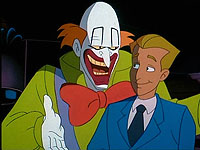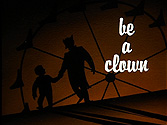|
 Besides
the dull, aching throb induced by a boring story, there lingers in this
viewer a sense that they really dropped the ball with this one. Besides
the dull, aching throb induced by a boring story, there lingers in this
viewer a sense that they really dropped the ball with this one.
The title card shows
the Joker and a small boy holding hands and skipping through an amusement
park. It's an intriguing image, but not for the idea that a small boy
might be entranced by the Joker. We're all entranced by him, and little
boys are entranced by even damnder things.
No, what is shocking
is that the Joker seems quite taken with the boy. How could such a thing
be possible? And what are its implications?
The Joker is famously
unpredictable, but this is an unpredictability of an entirely different
order. The iconography suggests a companionship that is natural and wholesome
and guileless. It doesn't suggest the Joker tempting an innocent into
the sinister funhouse that is evil, but of the Joker being tempted out
of it. If you contemplate that title card long enough, you have the startling
impression that, just maybe, in the company of such a child the Joker
might find a respite from hellish habits, a chance to return to a time
before mischief meant death and fun meant destruction. It suggests that
evil is the chore and that goodness is the holiday.
That, you may recall,
is the stabbing accusation made by Graham Greene (that novelist of wintry
paradox) at the conclusion of The End of the Affair: God, the sybaritic
Creator, offers us an infinite universe of happiness if only we will step
freely and heedlessly away from the webs of misery we spin for ourselves.
And it's a thought that, were it to pierce Gotham's gloom, would shatter
its Calvinistic integrity. For if the Joker could, in a moment of self-forgetfulness,
find grace and escape, whither Arkham and Stonegate? Indeed, whither Batman
and his imprisoning guilt?
Even leaving aside
the profound moral and psychological possibilities such an approach could
have raised, think of the potential improvement to the story. The "child
in jeopardy" is the meanest trick a melodrama can play, and the best
way to get a strongly drawn character like the Joker out of a predictable
rut is to put him an obvious situation and then have him react oppositely
to what one would predict. What could have been more dramatic than putting,
not Jordan, but the Joker and his entire being in jeopardy when the child,
with no malice aforethought, unintentionally kidnaps him. Imagine the
tension that would have followed and the suspense we might have felt as
we watched Jordan playing with a mad and capricious beast suddenly turned
playful. Is the Joker merely indulging some curiosity, to be discarded
once he gets bored? Or is it the beginning of a genuine reform? Can Batman
be trusted not to spoil things?
|


